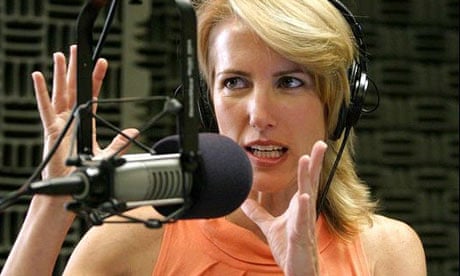Earlier this week, MSNBC host Ed Schultz used a misogynist slur against conservative commentator Laura Ingraham on his radio show, while discussing her hypocrisy towards the president:
"President Obama is going to be visiting Joplin, Missouri, on Sunday but you know what they're talking about, like this right-wing slut, what's her name?, Laura Ingraham? Yeah, she's a talk slut. You see, she was, back in the day, praising President Reagan when he was drinking a beer overseas. But now that Obama's doing it, they're working him over."
The well-deserved outrage was quick and furious, and MSNBC accepted what was reportedly Schultz's offer to take a week of unpaid leave as a consequence of his use of the epithet. Schultz also made an on-air apology, which, irrespective of whether he made it under duress, sounded genuine, to his credit. For their part, in a statement, MSNBC said, bluntly:
"Remarks of this nature are unacceptable and will not be tolerated."
By "of this nature", one can only assume they mean straight-up slurs, as remarks that demean women are, in fact, acceptable and will be tolerated at MSNBC – just so long as the man making them is sophisticated enough to use a dogwhistle instead of a naked epithet.
During the last presidential election, then candidate Hillary Clinton was routinely subjected to demeaning treatment from MSNBC's hosts, particularly the bombastic Chris Matthews, who got away with labelling Clinton a "she-devil" by putting a question mark after it, as if he was just asking, jeez! – a denial that would have been implausible even had he not later featured an image of Clinton sporting devil horns. His colleague David Shuster also went after Clinton with impunity, once playing with a "Jabber Jaw Pen" of Clinton laughing, referring to the laugh as "the refrain of Hillary cackling". So it's fine, by MSNBC standards, to imply that Clinton's a she-devil or a bitch or a witch – as long as you just don't actually say it.
The one time Shuster was held accountable for his misogynist antics was when he accused Clinton of "pimping out" her daughter Chelsea on the campaign trail. Shuster later offered an on-air apology to Clinton, but only after Clinton's campaign staff had to call to complain and her communications director had to threaten to refuse future debates on the network – and only because there was no way Shuster and MSNBC could deny the demeaning content of what he'd said.
Schultz, like Shuster in the latter example, faced consequences only because he engaged in overt misogyny and failed to signal it covertly behind careful language. Chris Matthews was able to say that Hillary Clinton only has a career because of whom she's married to – and get away with it because he was clever enough not to use the actual word "whore".
The effective result of MSNBC's double standard is that, far from discouraging its employees from engaging in misogyny, it actually rewards them for conveying their prejudices by dogwhistle sexism. Ostensibly banning the use of rank slurs, without penalising the sentiments behind them, elides the real and serious problem of gender bias in favour of a policy that essentially reduces to "don't get caught".
The consequence of the PR-sensitive but female-insensitive MSNBC policy, which tolerates misogyny as long as it contains no undeniable slurs, is to ensure that the most insidious brand of women-hatred is broadcast on their network, via plausibly deniable wink-wink implications, objections to which can be dismissed out of hand by labelling critics as "over-reacting" and "hypersensitive", "reading into things" and "looking for stuff to get mad about" – all the usual silencing techniques wielded against feminists who challenge institutional gender bias.
Thus is the "I don't see it, so you're a feminist hysteric" nature of public conversations about misogyny in media perpetuated, as if sexism cannot be objectively assessed. (Spoiler alert: it can.) Naturally, however, it is preferable for a for-profit network operating in a country where many of its potential viewers want and expect to have their misogynist opinions validated (such as that Hillary Clinton's only got a career because her husband cheated on her and people pitied her) to cultivate that system of covert misogyny and hysterical critics, rather than endeavor to jettison the sexism from its content altogether.
So MSNBC sent Schultz to his room without dinner for a week to contemplate what he did – surely hoping he will have learned his lesson: not that he ought be more compassionate, but that he ought to be more careful.
